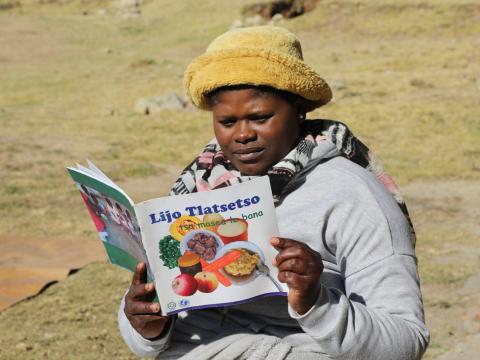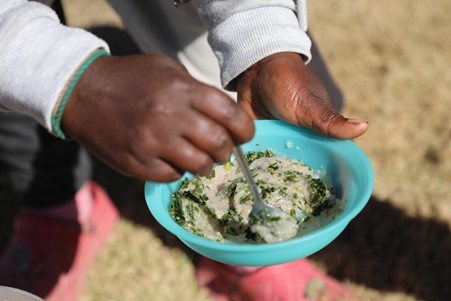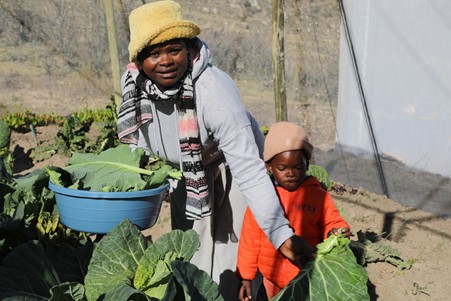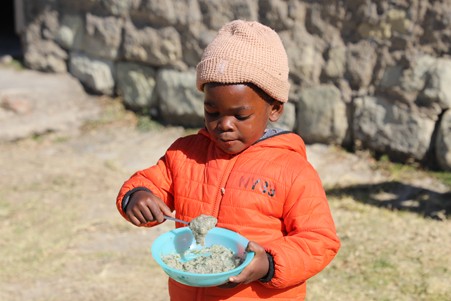How Mothers, Nutrition Knowledge, and Agriculture Are Ending Child Hunger and Malnutrition in Lesotho

By: Lerato Brown, Communications and Marketing Manager, World Vision Lesotho
In the heart of Ha Seeiso village, nestled in the rolling hills of Matelile, Lesotho, mothers have always done whatever it takes to care for their children. But feeding them has long been a daily battle, one waged with love, limited resources, and deeply held cultural beliefs. With Lesotho facing one of its worst hunger crises in years, many families are doing everything possible to shield their children from the sharp pangs of hunger. Yet hunger isn’t always loud; sometimes, it hides behind full stomachs and quiet nights, taking the silent form of malnutrition.
The Silent Signs of Malnutrition
Like many mothers in her village, ‘Makananelo relied on traditions passed down for generations: that a full belly meant a healthy child. Feeding children was about filling them, not necessarily nourishing them. “I fed them what I had: pap and potatoes, or porridge three times a day,” recalls ‘Makananelo, a mother of three. “To me, that meant they were full. I didn’t know I was doing anything wrong. I was just trying to keep them from going to bed hungry.” The thought that her children might be suffering from malnutrition, even with their stomachs were full, never crossed her mind.
"I was just trying to keep them from going to bed hungry.”- 'Makananelo
Hunger, she believed, was visible. But in reality, it often whispers through subtle signs: frequent illness, slow growth, dull skin, or a child who seems withdrawn. Clinic visits began to paint a different picture. Nurses expressed concern: her children were underweight. Their growth was delayed. And no matter how much porridge she served, nothing changed. She didn’t realize it then, but calories without nutrients weren’t enough. Her children were full but not truly fed. Across Lesotho, many mothers still equate food with fullness, unaware that true nourishment requires diversity, vitamins, and knowledge. Malnutrition wears many faces: a sleepy child, a toddler who doesn’t talk yet, a quiet bowl of porridge that fills but doesn’t fuel.
Knowledge as Nourishment

By 2023, the signs of widespread malnutrition in Ha Seeiso could no longer be ignored. What families lacked wasn’t just food, but understanding, guidance, and tools for lasting change. That’s when World Vision Lesotho stepped in—not with food parcels, but with something even more powerful: knowledge. “When World Vision came, they didn’t bring food parcels, they brought knowledge. And that knowledge saved us.” says ‘Makananelo. At the heart of this shift were Nutrition Clubs; safe, welcoming spaces where mothers of children under five could learn, cook, and share experiences. Cooking demonstrations introduced new ways to use local foods, like blending pap with spinach or adding pumpkin leaves to porridge to enrich meals.
“Before, I only thought about making them full, now, I think about making them healthy; porridge alone is not enough. A child needs more to grow.” says ‘Makananelo. The program also included Infant and Young Child Feeding (IYCF) counseling, offering hands-on support for breastfeeding, proper weaning, and feeding techniques. This empowered mothers with confidence and clarity. “I used to feel unsure, especially with my youngest, but the IYCF support gave me confidence. They didn’t just tell us what to do, they helped us do it.”
“Before, I only thought about making them full, now, I think about making them healthy; porridge alone is not enough. - 'Makananelo
Sowing Seeds of Sustainability

But the journey didn’t stop in the kitchen; it grew into the soil. With newfound knowledge of what their children needed, mothers were trained in climate-smart agriculture. Even the smallest backyards became spaces of promise. With practical skills like composting, water-saving, and intercropping, families began planting nutrient-rich vegetables right outside their doors. “Now we grow spinach, carrots, and pumpkin leaves,” says ‘Makananelo with pride. “It feels good to feed my children something real, something nourishing.” These home gardens became more than food sources—they became symbols of independence and resilience.
“It feels good to feed my children something real, something nourishing.” - 'Makananelo
No longer fully dependent on fluctuating market prices or food aid, mothers found strength in knowing that even without money, they could still put healthy food on the table. “Even when I don’t have money, I know I can go to my garden,” shares another mother. “That alone brings peace of mind.” The results were visible: glowing skin, energetic children, and meals made with ingredients grown by hand. Nutrition knowledge met self-reliance—and something transformative began to grow.
Real Results, Renewed Hope

Within just a few months of joining the Nutrition Club, ‘Makananelo witnessed a transformation she never imagined possible. Her youngest son, once lethargic, often sick, and worryingly underweight began to show signs of renewed life. He gained weight steadily, his skin regained its healthy glow, and he started playing with his siblings again, laughter filling the yard like music long forgotten. It wasn’t just his body that changed—it was his spirit. And with each new milestone, ‘Makananelo’s own confidence grew. “I used to think porridge was enough. Now I know better,” she says. “Now, I know what my children’s bodies need to grow. I feel empowered. I feel like a real provider, not just feeding my children, but nourishing them to become everything they can be.”
“Now, I know what my children’s bodies need to grow. I feel empowered. I feel like a real provider" - 'Makananelo
Her journey didn’t end with her family. Inspired by what she learned, ‘Makananelo took on a new role as a mentor. She encourages other women in the village to join the Nutrition Clubs. She invites them to her garden, showing how even a small plot can yield health-giving crops. She walks with them to clinic appointments, sharing her own story of fear, learning, and triumph. Today, she visits the clinic not with worry, but with pride. Her children are growing well, her household is more resilient, and her influence is spreading. Where once there was uncertainty, there is now assurance. Where once there was quiet despair, there is renewed hope, visible not only in her home but across the village.
From Surviving to Thriving
What began as a desperate attempt to keep hunger at bay has blossomed into something far more powerful: a community movement rooted in knowledge, resilience, and shared purpose. In Ha Seeiso, survival is no longer the goal, thriving is. The Nutrition Clubs, once simple gatherings under shade trees, have grown into vibrant hubs of transformation. Mothers who once questioned their abilities now lead group discussions, swap recipes, tend gardens together, and counsel one another through challenges. They no longer wait for help; they create it. Through these clubs, mothers have become champions of child health and nutrition. They’ve discovered strength in unity, shared experience, and the knowledge that change doesn’t have to come from outside, it can grow from within.
Their newfound confidence spills into every part of their lives, from advocating at local clinics to participating in village meetings with a renewed sense of voice and value. Most importantly, children are no longer just surviving, they are blossoming. School attendance is rising as children become healthier and more alert. They engage more in learning, play, and community life. Families build routines not just around eating, but around wellness and growth. The ripple effect is unmistakable. “It’s not just about food. It’s about love, learning, and leading each other forward,” says one club member. And in every lesson learned, every garden planted, every child thriving, one truth rings clear: thriving communities begin with empowered mothers.
“It’s not just about food. It’s about love, learning, and leading each other forward,”- club member
A Future Nourished by Knowledge
Across Ha Seeiso, more mothers are following in ‘Makananelo’s footsteps. The Nutrition Clubs have become beacons of hope, rooted in sisterhood, shared purpose, and sustainability. With the right support, even the most vulnerable households are rising. World Vision’s integrated approach of combining nutrition education, climate-smart agriculture, and child health advocacy is a powerful reminder that lasting change doesn’t come from handouts. It comes from equipping communities with tools, knowledge, and belief in their own power. “My children are strong now, and I know it’s because of what I learned. Thank you, World Vision. You gave us more than food, you gave us a future.” - ” says ‘Makananelo.
“My children are strong now, and I know it’s because of what I learned. Thank you, World Vision! You gave us more than food, you gave us a future.”- ” ‘Makananelo. “